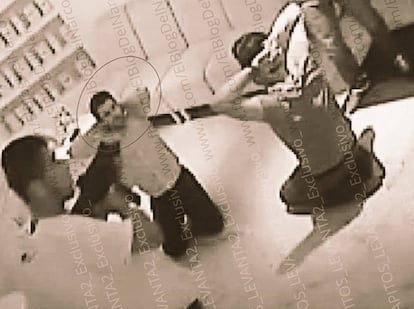‘El Chapo’ Guzmán’s son released unharmed, says family
Rival cartel accused of kidnapping jailed drug kingpin’s son as part of turf war


The son of Mexican drug kingpin Joaquin El Chapo Guzmán has been released a week after he was abducted, say members of the Sinaloa Cartel leader’s family. The news has not been confirmed by the Mexican authorities.
Jesús Alfredo Guzmán Salazar, 30, was freed along with the five other men kidnapped with him on August 15, a relative who requested anonymity for security reasons told AFP.
There has been media speculation of an imminent war for control of the area between the northern states of Sinaloa, Durango, and Chihuahua
Mexican weekly magazine Rio Doce said on its website that Alfredo Guzmán Salazar, aged 30, and considered the heir apparent to El Chapo, who was arrested in January and is awaiting extradition to the United States, had been released along with five other men who were taken at gunpoint from an upscale restaurant in the resort of Puerto Vallarta, on Mexico’s Pacific coast.
French news agency AFP said it had spoken to a member of the Guzmán family who said: “They were negotiating all this time, but they are now free and everything is fine.”
On Sunday morning, the Twitter account associated with Guzmán Salazar included a message saying: “One has to forget the past, make the best of what remains, and wait for what comes.”
The kidnapping of Alfredo Guzmán by upcoming drug cartel Jalisco Nueva Generación sent shock waves through Mexico, sparking fears of renewed violence. The cartel is locked in a turf war with the Sinaloa Cartel, which is trying to restructure in the wake of El Chapo’s incarceration.
Video footage released after the kidnapping showed how easily a group of heavily armed men from the Jalisco cartel had taken Guzmán Salazar without firing a shot.
In June, more than 100 unidentified armed men briefly took over the palatial residence occupied by El Chapo’s mother
It took the authorities two days to realize that El Chapo’s son was among the six men.
The incident highlighted the vulnerability of the Sinaloa Cartel now that its leader and founder is behind bars, and was just the latest in a series of blows it has suffered to its reputation.
In June, more than 100 unidentified armed men briefly took over the palatial residence occupied by El Chapo’s mother, Consuelo Loera, in the tiny village of La Tuna in the mountains of Sinaloa, close to the US border on Mexico’s Pacific coast.
Earlier in the year, two of El Chapo’s cousins were murdered.
There has been much speculation in the Mexican media of an imminent war for control of the so-called “golden triangle” between the northern states of Sinaloa, Durango, and Chihuahua, which is now a major heroin-producing area.
Some observers believe the assault on La Tuna was part of a power struggle within the Sinaloa Cartel pitting Alfredo and his brother Iván Archivaldo against the old guard, represented by the figure of their father’s former partner Ismael El Mayo Zambada. There has even been speculation that members of the Beltrán Leyva cartel, long-standing enemies of El Chapo, had returned to Sinaloa. But responsibility for the kidnapping of Alfredo points to the Jalisco Nuevas Generaciones.
The recapture of El Chapo, who has escaped from behind bars on two occasions, the last via a tunnel that was dug underneath his cell, has left a power vacuum within which episodes such as the kidnapping of his son adds further uncertainty to an already fragile situation, as Mexico’s leading criminal organization restructures.
English version by Nick Lyne.
Tu suscripción se está usando en otro dispositivo
¿Quieres añadir otro usuario a tu suscripción?
Si continúas leyendo en este dispositivo, no se podrá leer en el otro.
FlechaTu suscripción se está usando en otro dispositivo y solo puedes acceder a EL PAÍS desde un dispositivo a la vez.
Si quieres compartir tu cuenta, cambia tu suscripción a la modalidad Premium, así podrás añadir otro usuario. Cada uno accederá con su propia cuenta de email, lo que os permitirá personalizar vuestra experiencia en EL PAÍS.
¿Tienes una suscripción de empresa? Accede aquí para contratar más cuentas.
En el caso de no saber quién está usando tu cuenta, te recomendamos cambiar tu contraseña aquí.
Si decides continuar compartiendo tu cuenta, este mensaje se mostrará en tu dispositivo y en el de la otra persona que está usando tu cuenta de forma indefinida, afectando a tu experiencia de lectura. Puedes consultar aquí los términos y condiciones de la suscripción digital.








































